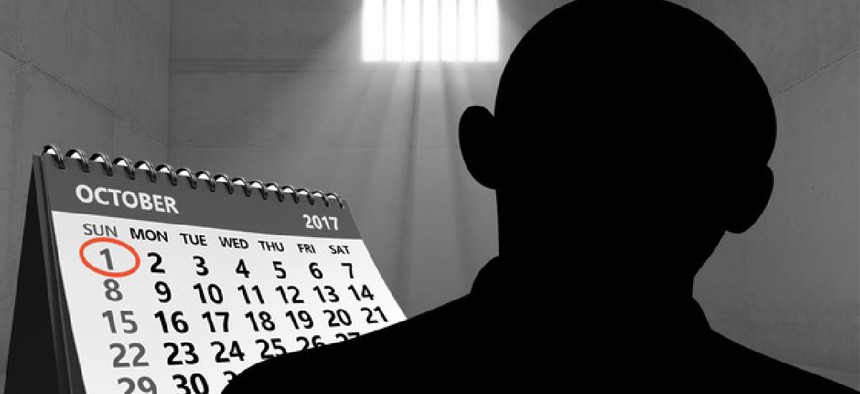Juvenile justice
Is New York City ready to implement Raise the Age?
Unanswered questions seem to jeopardize New York City's ability to meet the Oct. 1 deadline for implementing Raise the Age legislation. The city must remove youthful offenders from Rikers Island and move juvenile offenders to age-appropriate juvenile delinquent facilities.

A shadowed figure in a darkened room with barred windows alongside a calendar with the date Oct. 1 circled Images by Shutterstock, Illustration by Zach Williams/NYN Media
With the mandated Oct. 1 deadline for the Raise the Age legislation looming, nonprofits, corrections officers, and city council members remain skeptical about the city’s ability to implement it.
Raise the Age legislation raises the age of criminal responsibility in New York state from 16 to 18 years of age. The legislation takes effect for 16-year-olds on Oct. 1, 2018, and for 17-year-olds on Oct. 1 2019. All youth must be removed from Rikers Island and transferred to age-appropriate housing and programming. The new facilities will be operated by either the state Office of Children and Family Services or New York City’s Administration for Children’s Services. But questions remain as to whether the city has properly prepared for the hand-off.
“If the state does not give you everything that you ask for, are you still going to be able to deliver?” asked New York City Councilman Andy King, chair of the Committee on Juvenile Justice. “If someone comes home without their homework book, they still have to do their homework.”
King listened to testimony presented before the committee by Dana Kaplan, executive director of youth and strategic initiatives with the Mayor’s Office of Criminal Justice, at an April 18 oversight hearing. On behalf of the city, Kaplan expressed a commitment to being ready for the October 1 deadline. But critics found her comments to be insufficient at best, and inaccurate at worst.
“We are optimistic that we are on track,” Kaplan said after she was asked several times.
Yet, Kaplan suggested that if the city was not ready on time, the state would be to blame.
“We are concerned that the state has not been able to provide the necessary support, thus in peril is the city’s ability to meet the obligations of Raise the Age in a manner that we believe is the most safe and appropriate for young people in detention,” she said.
King was not persuaded. “I’m a little disappointed on the testimony that I heard. You didn’t talk about what your plans were for delivering on the state mandate. This was a whole bunch of nothing for me.”
Two main areas of contention were whether or not all relevant stakeholders had been engaged during the city’s planning process and whether Department of Corrections officers should interact with affected 16 and 17-year-olds.
“At the city-wide level, have any of the unions been brought in? Corrections? Probation?” said Councilman Rory I. Lancman, chair of the Committee on the Justice System.
“I believe that it has been discussed with corrections,” answered Kaplan.
Elias Husamadeen, president of the Correction Officers Benevolent Association, disagreed.
“What she said here today – she lied,” said Husamadeen.
He doubted the city would be ready by October 1 and said that pushing the date back by at least six months would be the responsible and “morally correct thing to do.” He also disagreed with letting corrections officers work with the juvenile offenders.
“Removing these teenagers from Rikers Island only to have them supervised by DOC corrections officers in a juvenile detention undermines the spirit and intent of Raise the Age,” Husamadeen said.
Members of the nonprofit sector also felt there were gaps in the city’s implementation process.
“We have not been brought in to the planning to date,” said Gabrielle Horowitz-Prisco, executive director of The Lineage Project which brings mindfulness programs to adolescents on Rikers Island.
Horowitz-Prisco cautioned that “it is not enough to take the same programs and just extend them to new populations. Programs are not an afterthought in the youth justice world.”
Beth Powers, director of youth justice with the Children’s Defense Fund, also noted that despite recent improvements there is a “history of mistreatment of youth” by the Department of Corrections. She emphasized the need for careful implementation of the law.
Another point of conflict was whether the city could access the state-run Ella McQueen juvenile residential center in Brooklyn. So far, the state has prevented the city from using this space.
“We believe that it is unacceptable that the state would mandate that young people be moved off Riker’s Island on an accelerated timeline, but not into the one existing juvenile detention facility that is operating virtually empty,” said Kaplan.
Lancman responded, “I do not understand why this city has the expectation to the point of entitlement that it should be able to use the Ella McQueen facility.”
Kaplan pointed out that use of the facility was one of a number of items, spelled out in a recent letter, that the city was waiting to hear back from the state about.
Lancman was aware of the letter.
“The letter set off alarm bells. Because it seemed to be establishing a rationale for blaming the state for not being ready,” Lancman said. “(Too) often this administration is blaming the state, the government, Mike Bloomberg, for things that, at least I believe, the city should be doing itself.”
